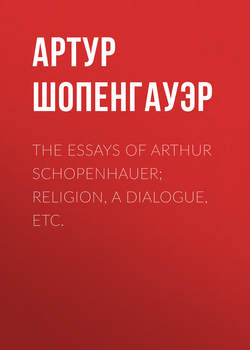The Essays of Arthur Schopenhauer; Religion, a Dialogue, Etc.

Реклама. ООО «ЛитРес», ИНН: 7719571260.
Оглавление
Артур Шопенгауэр. The Essays of Arthur Schopenhauer; Religion, a Dialogue, Etc.
PREFATORY NOTE
RELIGION: A DIALOGUE
A FEW WORDS ON PANTHEISM
ON BOOKS AND READING
PHYSIOGNOMY
PSYCHOLOGICAL OBSERVATIONS
THE CHRISTIAN SYSTEM
Отрывок из книги
Demopheles. Between ourselves, my dear fellow, I don't care about the way you sometimes have of exhibiting your talent for philosophy; you make religion a subject for sarcastic remarks, and even for open ridicule. Every one thinks his religion sacred, and therefore you ought to respect it.
Philalethes. That doesn't follow! I don't see why, because other people are simpletons, I should have any regard for a pack of lies. I respect truth everywhere, and so I can't respect what is opposed to it. My maxim is Vigeat veritas et pereat mundus, like the lawyers' Fiat justitia et pereat mundus. Every profession ought to have an analogous advice.
.....
Demopheles. But religion is not opposed to truth; it itself teaches truth. And as the range of its activity is not a narrow lecture room, but the world and humanity at large, religion must conform to the requirements and comprehension of an audience so numerous and so mixed. Religion must not let truth appear in its naked form; or, to use a medical simile, it must not exhibit it pure, but must employ a mythical vehicle, a medium, as it were. You can also compare truth in this respect to certain chemical stuffs which in themselves are gaseous, but which for medicinal uses, as also for preservation or transmission, must be bound to a stable, solid base, because they would otherwise volatilize. Chlorine gas, for example, is for all purposes applied only in the form of chlorides. But if truth, pure, abstract and free from all mythical alloy, is always to remain unattainable, even by philosophers, it might be compared to fluorine, which cannot even be isolated, but must always appear in combination with other elements. Or, to take a less scientific simile, truth, which is inexpressible except by means of myth and allegory, is like water, which can be carried about only in vessels; a philosopher who insists on obtaining it pure is like a man who breaks the jug in order to get the water by itself. This is, perhaps, an exact analogy. At any rate, religion is truth allegorically and mythically expressed, and so rendered attainable and digestible by mankind in general. Mankind couldn't possibly take it pure and unmixed, just as we can't breathe pure oxygen; we require an addition of four times its bulk in nitrogen. In plain language, the profound meaning, the high aim of life, can only be unfolded and presented to the masses symbolically, because they are incapable of grasping it in its true signification. Philosophy, on the other hand, should be like the Eleusinian mysteries, for the few, the élite.
Philalethes. I understand. It comes, in short, to truth wearing the garment of falsehood. But in doing so it enters on a fatal alliance. What a dangerous weapon is put into the hands of those who are authorized to employ falsehood as the vehicle of truth! If it is as you say, I fear the damage caused by the falsehood will be greater than any advantage the truth could ever produce. Of course, if the allegory were admitted to be such, I should raise no objection; but with the admission it would rob itself of all respect, and consequently, of all utility. The allegory must, therefore, put in a claim to be true in the proper sense of the word, and maintain the claim; while, at the most, it is true only in an allegorical sense. Here lies the irreparable mischief, the permanent evil; and this is why religion has always been and always will be in conflict with the noble endeavor after pure truth.
.....